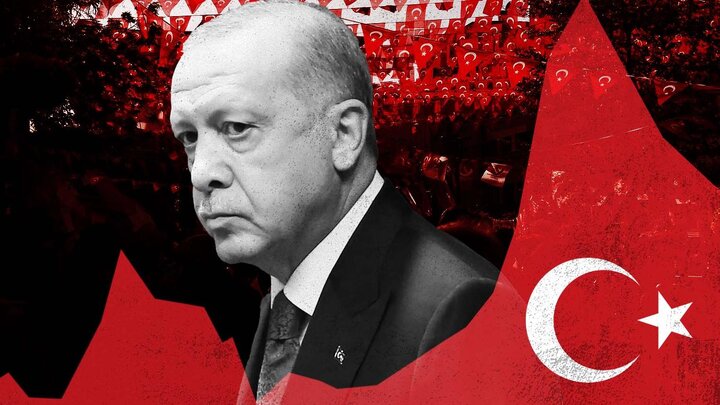Iran (IMNA) - The country's Supreme Election Council reports that Kemal Kilicdaroglu, the joint opposition candidate, came in second with 47.8 percent of the vote against the elected president's 52.2 percent.
85.7 percent of eligible voters participated, which is around 3 percent less than in the first round on May 14th.
Kilicdaroglu, who in the first round put up an intense challenge to the president with the longest presidency in the country, claimed it was "the most unfair election in years," but he did not contest the results.
Iran's President Ebrahim Raisi congratulated his Turkish counterpart as soon as the results were announced, calling the win a "sign of continued valuable trust" that the Turkish people have in the current administration.
President Raeisi voiced assurance that Erdogan's second term as president will see significant progress in ties between the Islamic Republic of Iran and the Republic of Turkey.
He stated that there were significant historical, cultural, and religious ties between the two adjacent nations, as well as friendly connections, respect, and common interests.
Given their shared objectives and challenges, Erdogan's reelection has increased the likelihood that Iran and Turkey will develop tighter ties.
President Raeisi voiced assurance that Erdogan's second term as president will see significant progress in ties between the Islamic Republic of Iran and the Republic of Turkey.
He stated that there were significant historical, cultural, and religious ties between the two adjacent nations, as well as friendly connections, respect, and common interests.
Given their shared objectives and difficulties, Erdogan's reelection has increased the likelihood that Iran and Turkey will develop tighter ties.
With Erdogan as president over the past 20 years, commerce between Tehran and Ankara has grown, with Turkey being one of the few countries to steadfastly stand up against the US sanctions against Iran.
According to the latest statistics issued by the Turkish Statistical Institute, commerce between Iran and Turkey reached $5.35 billion in 2022, indicating a 12.18% increase year over year.
Iran, on the other hand, was among the first countries to condemn a military coup attempt against the Erdogan administration in 2017 and was also among the first to provide rescue teams and emergency aid following Turkey's deadly earthquake in February.
There are still a lot of issues in the ties between Tehran and Ankara that can be handled in the future through multilateral discussion in line with the growing tide of regional integration.
Turkey now has a lot in common with Iran's Islamic Republic after 1979.
Turkey is aware that, although it is a component of the US-led NATO military alliance, Washington does not regard it as an equal partner but rather as a subservient state.
The strongest proof for this is the US blackmail about the procurement of non-Western weapons, removing Ankara from fighter jet development programs, and punishing Turkish firms.
Unknown to many is the truth that Turkey, like the Islamic Republic of Iran, has suffered from scientific-industrial terrorism, with several military engineers mysteriously dying.
That demonstrates that certain bodies are annoyed by the development of sophisticated technology worth billions of dollars in countries like Turkey and Iran, which threatens the monopoly of a few Western powers.
Iranian experiences with the Joint Comprehensive Plan of Action (JCPOA) and Turkey's interactions with European countries considering EU membership are strikingly similar.
Both situations started out with a lot of promise and high hopes, but they came to an abrupt end with backstabbing, abdications of duty, and persistent demands for something for nothing.
Following the past US administration's blatantly illegal unilateral withdrawal from the 2015 nuclear deal, European nations failed to keep their promises to save the agreement.
In the West, there is also a great deal of interest in the politics of Turkey and Iran.
Adam McConnel, a professor at Istanbul's Sabanci University, criticized the Western media for disrespecting Turkish voters in a piece published by Anadolu Agency on Monday.
He claimed that the "only path open to the Western press is to start by respecting the choices of the Turkish voters and then working to fully understand those choices."
In addition to their political opinions, recent surveys reveal that the majority of Turks view Iran as a friendly country, reject sanctions against it, and have mistrust for the NATO alliance.
In keeping with the aspirations of the people of both countries and during the shift from a unipolar to a multipolar world order, the groundwork has been laid for the growth of partnerships between Iran and Turkey during Erdogan's new term as Turkish president.


Your Comment